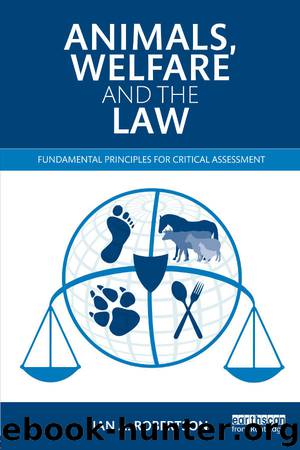Animals, Welfare and the Law: Fundamental Principles for Critical Assessment by Robertson Ian A

Author:Robertson, Ian A. [Robertson, Ian A.]
Language: eng
Format: epub
Publisher: Swales and Willis
Published: 2015-07-15T16:00:00+00:00
The government
Some would say the government has the ‘ultimate say’ given that it allegedly sets the relevant benchmarks, and potential ‘penalties’ for non-compliance with established legal criteria. That said, industry has considerably more flexibility in establishing its trading criteria than government. It must give consideration to national and international trade rules (e.g., those established by the World Trade Organization), but none the less has substantially more freedom in terms of its trading agreements. They include the ability to adapt its agreements to what is deemed economically/politically necessary, and the ability to move its primary operation to another legal jurisdiction with different/less restrictive legal criteria.
There have been occasions when the law has led public opinion by shifting what’s lawful, which in turn shifts perceptions about what is socially acceptable, for example, decriminalisation of homosexuality and prostitution in some countries. Arguably, that ‘influence’ on the law ‘goes both ways’ and is subject to the practical reality that politicians/legislators are widely driven by, and dependent upon votes from the public, and money representative of ‘The Golden Rule’ (described as ‘He who owns the gold makes the rules’).
The reality is that the government, in seeking to be effective and to implement cost-cutting efficiencies, has put considerable effort into ‘collaborating’ with wider stakeholders (e.g., industry) to facilitate improved compliance with standards of animal welfare. This obviously has significant advantages in respect of outcomes that benefit participating stakeholders. Government, for example, avoids incurring the cost of engaging more investigators by enlisting the wider eyes and ears of stakeholders in monitoring and detecting compliance with standards of animal welfare, and engaging methods of persuasion with the help of industry. Industry benefits from the relationship as well, because it is equally in the interests for national and potentially international markets, to trade on the back of trading-partner perceptions of a well-enforced system, ensuring high standards of animal welfare.
However, as with most arrangements, the collaboration is limited. Industry bodies have obligations to their wider members (e.g., farmers), so, while it is democratically advantageous to censure the unlawful activities of a minority/one member, membership perceptions that industry bodies and/or representatives have assumed a ‘policing’ role risks outcomes which are counter-productive to the participating industry itself. So, industry’s collaborative support to government in practical terms is limited to matters involving ‘compliance’. It has demonstrated a resistance to extending this collaboration to activities traditionally seen as government responsibilities of ‘enforcement’ .
Download
This site does not store any files on its server. We only index and link to content provided by other sites. Please contact the content providers to delete copyright contents if any and email us, we'll remove relevant links or contents immediately.
Machine Learning at Scale with H2O by Gregory Keys | David Whiting(4292)
Killers of the Flower Moon by David Grann(4039)
Oathbringer (The Stormlight Archive, Book 3) by Brandon Sanderson(3157)
Will by Will Smith(2908)
Once Upon a Broken Heart by Stephanie Garber(2845)
Guns, Germs and Steel by Diamond Jared(2365)
It Starts With Us (It Ends with Us #2) by Colleen Hoover(2341)
Borders by unknow(2303)
Friends, Lovers, and the Big Terrible Thing by Matthew Perry(2219)
The Room Where It Happened by John Bolton;(2151)
The Color of Law by Richard Rothstein(1935)
A Short History of War by Jeremy Black(1842)
The Strength In Our Scars by Bianca Sparacino(1840)
HBR's 10 Must Reads 2022 by Harvard Business Review(1839)
A Game of Thrones (The Illustrated Edition) by George R. R. Martin(1722)
Water Rights and the Environment in the United States by John Burch(1679)
515945210 by Unknown(1660)
Examples & Explanations: Administrative Law by William F. Funk & Richard H. Seamon(1642)
That Every Man Be Armed by Stephen P. Halbrook(1577)
